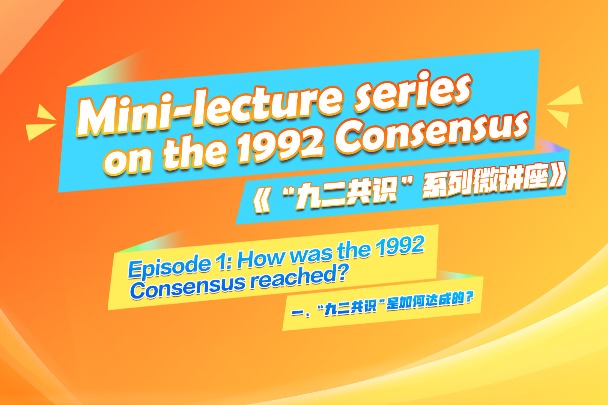China stresses its stance on Taiwan Strait

Slamming G7 remarks, Beijing says it won't tolerate external interference
The Foreign Ministry reiterated on Monday that safeguarding stability, peace, and tranquility in the Taiwan Strait requires unequivocal support to the one-China principle as well as opposition to "Taiwan independence" separatist activities.
The ministry's spokesman Wang Wenbin made the remarks at a news briefing after the foreign ministers of the Group of Seven nations said on Sunday that they opposed any unilateral attempt to change the status quo in the Taiwan Strait by force.
The Chinese mainland and Taiwan, though has not been reunited, belong to one and the same China, Wang said, adding that the real status quo is that Taiwan is part of China's territory, and China's sovereignty and territorial integrity has never been divided.
Facts have proved that the separatist activities of "Taiwan independence" forces, under the support and connivance of external forces, are the fundamental reasons behind the tensions in the Taiwan Strait and undermine the status quo in the area, Wang said.
The Taiwan question is China's internal affair and brooks no external interference, he stressed.
It is irresponsible to only pay lip service to the one-China principle while turning a blind eye to the "Taiwan independence" separatist activities, he said, adding that such practice harms peace and stability in the Taiwan Strait.
Also at the news conference, Wang slammed a G7 joint statement voicing endorsement of the Japanese government's plans to discharge Fukushima radioactive wastewater into the Pacific Ocean, saying Japan's practice of whitewashing its wrong decision is futile.
Out of political purposes, Japan has been ignoring the science-based and legitimate security concerns of the international community, and has been trying to downplay and cover up the hazards of the discharge by roping in other countries supporting its plan, Wang said, adding that the international community has expressed strong concerns and opposition to the controversial plan.
A recent global opinion poll conducted by China Global Television Network showed that 93 percent of respondents were strongly opposed to Japan dumping nuclear-polluted water into the sea.
The survey said that 90 percent of people express that they do not trust the statement of the Japanese government and Tokyo Electric Power Company that the treated water is safe.
Politics over science
The nongovernmental organization Greenpeace on Sunday criticized that the G7 has chosen politics over science and the protection of marine environment after the G7 Ministers' Meeting on Climate, Energy and Environment issued the statement.
Japan failed to investigate the effects of discharging multiple radionuclides on marine life, and its plans violated the United Nations Convention on the Law of the Sea, the organization said in an article.
The Japanese government will not win any support if it unilaterally decides to dump the polluted water into the ocean, and transfer the unpredictable risks to the whole world, Wang said.
Tokyo should take responsibility and carry out consultations with relevant parties, study the best alternative to ocean discharge to ensure nuclear-contaminated water is handled in a scientific, open, transparent, and safe manner under international supervision, he said.
Japan must not start discharging the water before reaching consensus through consultation with neighboring countries and other parties involved as well as relevant international agencies, he said.
- Top News
- Events honor role of first provincial governor in modernizing Taiwan
- 'Soul Ferryman' of Taiwan Strait: Liu De-wen's 22-year mission to bring veterans home
- Taiwan-born kendo instructor grows cross-Strait ties
- Chinese mainland says cross-Strait consultation possible with recognition of '1992 Consensus'




